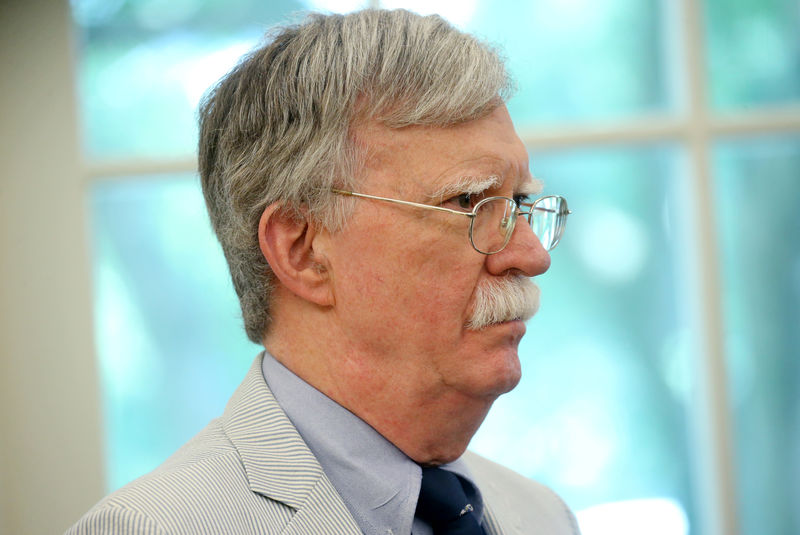(Reuters) - U.S. national security adviser John Bolton departed on Saturday for a trip to Japan and South Korea, two key allies of Washington that are embroiled in a trade dispute.
A White House National Security Council spokesman said on Twitter that Bolton planned to "continue conversations with critical allies and friends".
President Donald Trump on Friday offered his help to ease tensions in the political and economic dispute between the United States' two biggest allies in Asia, which threatens global supplies of memory chips and smartphones.
Lingering tensions, particularly over compensation for South Koreans forced to work for Japanese occupiers during World War Two, worsened this month when Japan restricted exports of high-tech materials to South Korea.
Japan has denied that the dispute over compensation is behind the export curbs, even though one of its ministers cited broken trust with Seoul over the labor dispute in announcing the restrictions.
The export curbs could hurt global technology companies.
Lee Seok-hee, chief executive of SK Hynix, the world's No.2 memory chip maker, headed to Japan on Sunday and will meet Japanese suppliers to discuss ways to secure raw materials, the company said.
Trump told reporters at the White House on Friday that South Korean President Moon Jae-in had asked him whether he could get involved.
A spokeswoman for Moon confirmed Moon had asked Trump for help at their summit in Seoul on June 30.
Bolton will visit South Korea from July 23 to 24, South Korea's presidential office spokeswoman Ko Min-jung said. He will meet South Korean national security adviser Chung Eui-yong on Wednesday to discuss a permanent peace regime on the Korean Peninsula and a strengthened alliance between Seoul and Washington.
During his trip, Bolton is also likely to seek support for a U.S. initiative to heighten surveillance of vital Middle Eastern shipping lanes, which has been greeted warily by allies reluctant to raise tensions with Iran. Washington blames Tehran for recent attacks on tankers.
Japanese media have said the issue could be on the agenda when Bolton visits Japan, where any military commitment abroad would risk inflaming a divide in public opinion in a country whose armed forces have not fought overseas since World War Two.
A South Korean official said last week Washington had yet to make any official request to Seoul on the issue.
The chairman of the U.S. Joint Chiefs of Staff, Marine General Joseph Dunford, said this month Washington hoped to enlist allies in a military coalition to safeguard strategic waters off Iran and Yemen.
But with allies reluctant to commit new weaponry or fighting forces, a senior Pentagon official told Reuters on Thursday the aim was not to set up a military coalition but to shine a "flashlight" in the region to deter attacks on commercial shipping.
Kathryn Wheelbarger, who briefed NATO allies in the past week on the U.S. proposal, said it was less operational and more geared toward increasing surveillance capabilities.
Japan is the world's fourth-biggest oil buyer and 86% of its oil supplies last year passed through the Strait of Hormuz, a vital shipping route linking Middle East oil producers to markets in Asia, Europe, North America and beyond.

Japan's position is complicated by its friendly ties with Iran. Japanese Prime Minister Shinzo Abe made an unsuccessful bid to ease tensions in the region when he met Iranian leaders in Tehran last month.